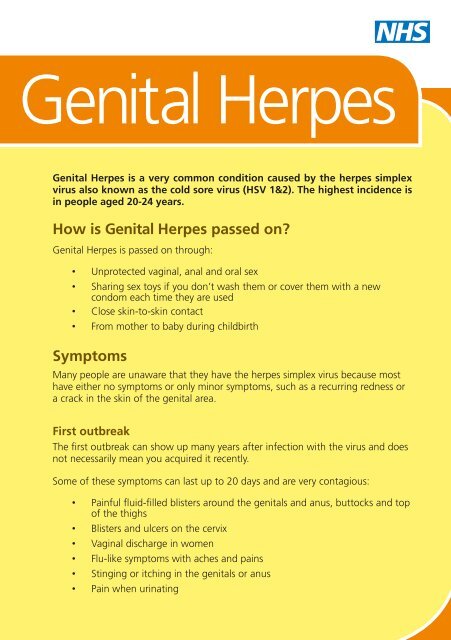Genital Herpes
Genital Herpes
Genital Herpes
Create successful ePaper yourself
Turn your PDF publications into a flip-book with our unique Google optimized e-Paper software.
<strong>Genital</strong> <strong>Herpes</strong><br />
<strong>Genital</strong> <strong>Herpes</strong> is a very common condition caused by the herpes simplex<br />
virus also known as the cold sore virus (HSV 1&2). The highest incidence is<br />
in people aged 20-24 years.<br />
How is <strong>Genital</strong> <strong>Herpes</strong> passed on<br />
<strong>Genital</strong> <strong>Herpes</strong> is passed on through:<br />
• Unprotected vaginal, anal and oral sex<br />
• Sharing sex toys if you don’t wash them or cover them with a new<br />
condom each time they are used<br />
• Close skin-to-skin contact<br />
• From mother to baby during childbirth<br />
Symptoms<br />
Many people are unaware that they have the herpes simplex virus because most<br />
have either no symptoms or only minor symptoms, such as a recurring redness or<br />
a crack in the skin of the genital area.<br />
First outbreak<br />
The first outbreak can show up many years after infection with the virus and does<br />
not necessarily mean you acquired it recently.<br />
Some of these symptoms can last up to 20 days and are very contagious:<br />
• Painful fluid-filled blisters around the genitals and anus, buttocks and top<br />
of the thighs<br />
• Blisters and ulcers on the cervix<br />
• Vaginal discharge in women<br />
• Flu-like symptoms with aches and pains<br />
• Stinging or itching in the genitals or anus<br />
• Pain when urinating
Recurrent outbreaks<br />
Recurrent outbreaks tend to be milder, less frequent and clear up more quickly<br />
because the body has formed protective antibodies to fight the infection.<br />
Outbreaks are often brought on by ultra violet light, stress, a low immune system,<br />
friction in the genital area, being ill or surgery on the genital area.<br />
Getting tested<br />
A diagnosis is made by looking at the affected areas and taking a swab from one<br />
of the blisters.<br />
Where to get tested<br />
Sexual Health Clinics<br />
• Manchester Centre for Sexual Health - 0161 276 5200<br />
• North Manchester General - 0161 918 4263<br />
• Withington Community Hospital - 0161 217 4939<br />
Young People<br />
• Brook (under 19s) - 0161 237 3001<br />
Lesbian, gay and bisexual<br />
• Lesbian and Gay Foundation (LGF) – 0845 3 30 30 30<br />
Treatment<br />
With the first outbreak it is beneficial to have a short course of antiviral tablets<br />
for five days, which helps your body manage the new virus and may mean it is<br />
less likely to recur. Some people, mainly with type 2 herpes, get monthly or twomonthly<br />
recurrences, which can be treated with tablets to suppress the virus. If you<br />
are pregnant, talk to your doctor or midwife about herpes:- even if you are not<br />
known to have herpes, it may be beneficial to have treatment.
Prevention<br />
If you have been diagnosed with herpes:<br />
• Avoid sexual contact until all the symptoms (blisters or ulcers) have<br />
cleared up<br />
• After your symptoms have gone, use a condom for vaginal, anal or oral<br />
sex and when using sex toys. However, if the virus is still present around<br />
the genital or anal area, there is still a possibility that the virus can be<br />
passed on.<br />
• Avoid kissing your partner or engaging in oral sex if either of you has a<br />
cold sore around your mouth.<br />
To protect yourself and partners against genital herpes:<br />
• Use a condom for vaginal, anal and oral sex<br />
• Use a dental dam or latex barrier for oral sex with a woman<br />
• If you share sex toys, use a new condom or wash them before anyone<br />
else uses them
For more information about sexually transmitted infections go to: www.nhs.uk<br />
This fact sheet has been produced by the Sexual Health and Harm Reduction Team.<br />
© Manchester Mental Health and Social Care Trust. September 2013.


